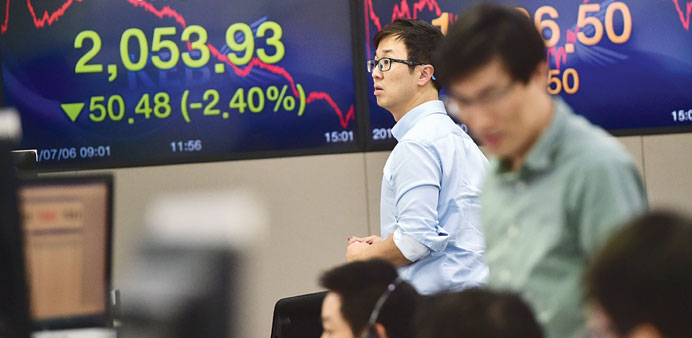A currency dealer walks past a screen showing the benchmark stock index in a trading room at the Korea Exchange Bank in Seoul. South Korean shares closed 2.4% lower yesterday, as Asian stocks mostly fell after Greek voters rejected more austerity demands from creditors.
AFP
Tokyo
Asian equities fell yesterday after Greece overwhelmingly rejected further austerity measures, pushing it closer to a eurozone exit, while Shanghai underwent another day of volatility as China introduced a raft of measures to shore up the slumping market.
Despite growing concerns about Athens’ place in the eurozone, the single currency rallied after Greece’s combative Finance Minister Yannis Varoufakis announced his shock resignation just hours after winning Sunday’s referendum.
Tokyo fell 2.08%, or 427.67 points, to 20,112.12, Seoul shed 2.40%, or 50.48 points, to 2,053.93 and Sydney lost 1.11%, or 61.60 points, to 5,476.70.
Shanghai soared 7.82% at the open before sinking rapidly again – losing almost 1% briefly in the afternoon. But it ended the day 2.41% higher, adding 89points, to 3,775.91.
Hong Kong plunged 3.18%, or 827.83 points, to 25236.28 – wiping out a 0.70% rise in the opening minutes that came on the coat-tails of the mainland gains. More than 60% of Greece’s voters heeded the government’s call to vote “No”, brushing aside warnings from European leaders that it was effectively an in-out poll on the euro.
While the euro sank to $1.0963 in US electronic trade immediately after the poll, it recovered throughout Monday and ticked even higher after Varoufakis’ announcement. The combative Varoufakis – who has been at the centre of Athens’ high-profile debt negotiations for months – clashed with Greece’s creditors and refused to bow to their demands for tough austerity.
The single currency was also at 135.45 yen compared with 134.91 yen in the US.
“There’s nothing we can do now except lower our risk and wait,” said Ayako Sera, a strategist at Sumitomo Mitsui Trust Bank, told Bloomberg News.
“The euro was created based on this great dream of a unified Europe, and if they withdraw from the euro then the whole system is going to come into question.” The dollar weakened to 122.52 yen from 123.05 yen on Friday.
Shanghai blasted out of the blocks after the government announced a series of measures at the weekend to back up the struggling mainland markets, which have lost about a third of their value since peaking on June 12.
On Sunday, Beijing said the central bank would provide liquidity through the state-backed China Securities Finance Co, which manages margin trading. And market watchdog the China Securities Regulatory Commission said there would be no initial public offerings (IPOs) “in the near future”.
On Saturday China’s 21 largest brokerage firms said they would invest at least 120bn yuan ($19.3bn) in so-called “blue chip” exchange traded funds (ETFs). The moves come after other actions last week failed to arrest steep declines. However, Jimmy Zuo, a trader at Guosen Securities Co in Shenzhen, said: “The market didn’t buy into the measures and the downbeat mood is quite hard to change.”
On oil markets, US benchmark West Texas Intermediate for delivery in August plummeted $2.10 to $54.83 a barrel and Brent crude tumbled 75 cents to $59.57. Gold fetched $1,167.50 compared with $1,168.43 late Thursday.
In other markets, Bangkok fell 1.10%, or 16.36 points, to 1,473.23; Malaysia’s key index dropped 0.99%, or 17.19 points, to 1,717.05; Singapore closed 0.29%, or 9.79 points, lower at 3,332.94; Jakarta ended down 1.33%, or 66.17 points, at 4,916.74; Taipei slipped 1.09%, or 102.27 points, to 9,255.96; Wellington was off 1.10%, or 64.28 points, at 5,776.62 and Manila fell 1.06%, or 80.15 points, to 7,455.15.

